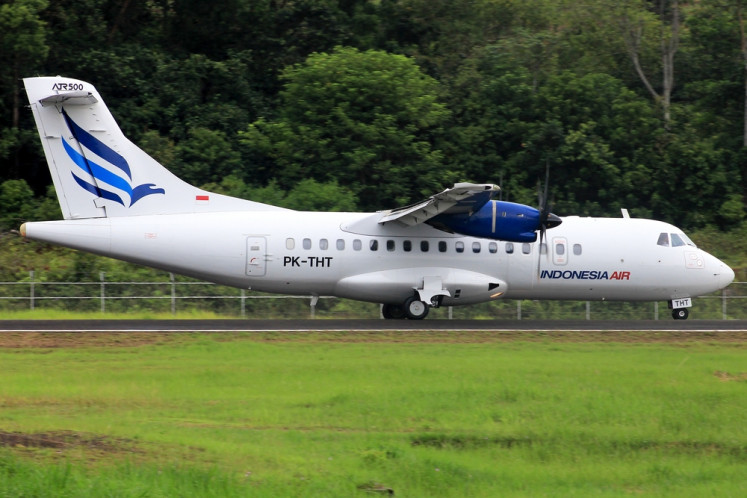Popular Reads
Top Results
Can't find what you're looking for?
View all search resultsPopular Reads
Top Results
Can't find what you're looking for?
View all search resultsWaiting for the top-two among 13 in Timor Leste election
Thirteen registered candidates will contest Timor Leste’s presidential election on March 17 and the campaign season just began last week
Change text size
Gift Premium Articles
to Anyone
T
hirteen registered candidates will contest Timor Leste’s presidential election on March 17 and the campaign season just began last week.
Despite the lack of surveys to measure the chances of potential candidates, four figures are strongly predicted to lead the pack including the incumbent, Jose Manuel Ramos-Horta, head of the Revolutionary Front for an Independent East Timor (Fretilin); Francisco Lu-Olo Guterres, head of the Democratic Party (PD); Fernando Lasama de Araujo; and former armed forces chief Gen. Taur Matan Ruak.
Deputy Prime Minister Jose Luis Guterres (Lu Gu), a Fretilin powerbroker with his new party, Frenti-Mudanca (Fretilin-reformist), may have been included. The second-largest party in 2007, the National Reconstruction Congress of Timor Leste (CNRT), led by Kay Rala Xanana Gusmao, did not name its candidate, however. Xanana, currently the prime minister, and his rival Mari bin Amude Alkatiri (Fretilin’s secretary-general) will focus on the legislative election, which will be held in June 2012.
In the 2007 election Lu Olo, Ramos-Horta and Lasama won 28 percent, 22 percent and 19 percent of the vote, respectively, with the first two making it through to the run-off, which was eventually won by Ramos-Horta.
Prior to the closing date of the registration of candidates last month, President Horta had received around about 9,000 signatures of support, while Lu Olo claimed to have collected 23,000 signatures. Under Timor Leste law, a candidate must present at least 5,000 signatures of support.
PD chief, Lasama, currently the parliamentary speaker, has carried out some political lobbying. The positive outcome is that he received a great deal of support from other political parties in the Dili district. Besides this, a rumor has circulated about a serious rupture within the internal party that could disrupt Lasama’s leadership.
Frenti-Mudanca has another obstacle in collecting sympathizers’ signatures. Efforts to reach out to the grassroots level seem too ambitious as not all Timorese are aware of Lu Gu’s track-record and reputation. Indeed, he is well known only among scholars and urbanites.
The suggestion by President Ramos-Horta that certain parties will have to focus solely on the parliamentary election is unlikely to be implemented.
The role of and support from political parties for presidential candidates remain similar to 2002 and 2007. A signal from President Horta that he doesn’t need any support from political parties has no influence.
An important decision was taken by the CNRT secretary-general and the campaign team that the party should pool its support for independent candidate Taur Matan Ruak. With or without the CNRT’s support, Taur, also known as Jose Maria Vasconcelos, is a popular figure among the candidates.
Bearing in mind that the PD’s votes are likely divided and Frenti-Mudanca is “sluggish”, the three-way tie involving Horta-Lu Olo-Lasama in the 2007 election will most likely become a Horta-Lu Olo-Taur trio this time around.
The three options as to who will be the top two in the first round, Horta and Lu Olo or Horta and Taur or Lu Olo and Taur, remain unpredictable.
The reason why Horta, the Noble Peace Prize co-laureate in 1996, is seeking reelection is because of strong support from people who invested in him politically, such as those from the United States, Australia, Portugal and Indonesia.
But he is prepared to lose the election. Horta’s ambition for power is not as strong now as it was in 2007. He receives no support from any political parties; unlike he did in 2007, when Xanana and his followers were behind him.
No one is sure how bad the relations are between Horta and Gusmao, but they are understood to have remained closely linked politically. In a speech announcing his decision to seek a second term, Horta, a reluctant politician-turned-president, said he hesitated about running against Lu-Olo or Taur. He thought of retiring and giving way to one of them.
Does this message indicate that the way is open for a shift in power? In other words, will Taur and Lu-Olo qualify for the run-off? It seems unlikely, since Horta’s thousands of followers with their new slogan tenqi continua! (must continue) have built a strong support base by taking advantage of Horta’s leadership during his terms in office — five years as head of state and almost a year as premier.
Almost 12 years ago, on Aug. 20, 2000, in his speech in the small town of Aileu before United Nations officials and the diplomatic corps, Taur stressed: “Our actions will always be directed toward harmony and cooperation amongst nations. With our neighbors, particularly with Indonesia and Australia, we share the principles of equality and mutual respect.”
Nine years later, General Djoko Santoso, then the TNI commander, was greeted by General Taur at the Timor Leste armed forces headquarters in Tacitolu.
In September last year, Golkar Party chairman Aburizal Bakrie and Indonesian Democratic Party of Struggle (PDI-P) politician, Sidarto Danusubroto, gathered with Freitilin’s central committee, chairman Lu Olo and secretary-general Mari Alkatiri during a Fretilin congress in Dili.
In short, both Taur and Lu Olo, both of whom are war veterans, are now close to Indonesian bureaucrats and politicians.
Therefore, whoever wins the presidency will continue his predecessor’s policy to promote national unity as well as reconciliation and partnership with Indonesia.
The writer was the Indonesian representative to the United Nations Transitional Administration (UNTAET) in Dili (2000-2003).










